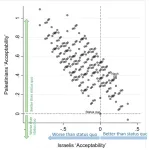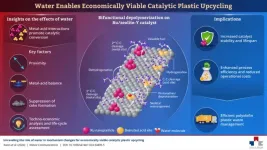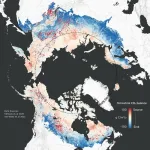(Press-News.org) EMBO announces that ten life scientists have been selected to receive EMBO Installation Grants. These grants support group leaders, who are in the early stages of setting up their laboratories, to strengthen the life sciences in countries participating in the scheme. Two new installation grantees will establish laboratories in Croatia, one in Czechia, one in Estonia, two in Greece, three in Poland and one in Portugal.
“EMBO Installation Grants offer flexible funding, extensive networking opportunities and practical support for life scientists pursuing ambitious research projects,” says EMBO Director Fiona Watt. ”We are delighted to welcome the new EMBO Installation Grantees to our vibrant community and wish them every success in their careers.”
All EMBO Installation Grantees have demonstrated their international mobility and research experience. Five of the ten grantees are female, four are male, and one preferred not to specify their gender.
Each grantee receives 50,000 euros annually for five years. They become part of an international network of nearly 800 current and former EMBO Installation Grantees, Young Investigators and Global Investigators. Further benefits include access to mentoring, training courses, additional grants, e.g., for travel or organizing conferences, as well as to core facilities at the European Molecular Biology Laboratory (EMBL) in Heidelberg, Germany.
This year’s grants are supported by the Ministry of Science and Education of Croatia; the Ministry of Education, Youth and Sports of Czechia; the Estonian Research Council; the General Secretariat for Research and Innovation of Greece; the Ministry of Science and Higher Education of Poland; and the Foundation for Science and Technology of Portugal. For the first three years, 35,000 euros of the annual grant are provided by the ministry or funding agency in the participating country and 15,000 euros by EMBC, the intergovernmental organization of 31 member states that funds the EMBO Programmes. The final two years are funded by the ministry or funding agency.
The next application deadline is 15 April 2025. More information on EMBO Installation Grants, including eligibility criteria and the application process, is available here.
EMBO Installation Grantees
Name
Research project
Host institute
Dimitrios Anastasakis
Developing innovative methods to identify novel pre-mRNA processing factors
University of Crete, Heraklion, GR
Damir Baranasic
PROSPER: PROmoter STRucture and Protist Evolutionary Resilience
Ruđer Bošković Institute, Zagreb, HR
Jelena Bujan
Unravelling insect resistance to extreme heat stress
Ruđer Bošković Institute, Zagreb, HR
Sara Calafate
Unveiling the impact of sleep-dependent processes on neuronal homeostasis in AD
University of Minho, Braga, PT
Grzegorz Grabe
Investigation of Salmonella pathogenicity and survival
University of Gdańsk , PL
Ioanna Keklikoglou
Understanding myeloid cell heterogeneity in metastatic niches after chemotherapy
University of Crete, Heraklion, GR
Mattia Morandi
Membrane biophysics of extracellular vesicles in health and disease
International Institute of Molecular Mechanisms and Machines, Polish Academy of Sciences, Warsaw, PL
Mari Sepp
Cellular phenotypes in the cerebellum: implications in evolution and disease
University of Tartu, EE
Petr Tesina
Mechanistic studies of human co-translational quality control
Central European Institute of Technology, Brno, CZ
Lidia Wrobel
Spatial organisation of protein quality control in neurodegenerative diseases
International Institute of Molecular and Cell Biology, Warsaw, PL
END
Ten group leaders awarded EMBO Installation Grants
2025-01-21
ELSE PRESS RELEASES FROM THIS DATE:
Telephone therapy reduces fatigue interference with activities, mood and cognition for metastatic breast cancer survivors
2025-01-21
INDIANAPOLIS -- With medical advances, more than 169,000 people in the United States are living with metastatic breast cancer. Addressing debilitating symptoms has become increasingly crucial. Fatigue remains a significant challenge, affecting up to 63 percent of patients and severely impacting daily functioning.
A study demonstrates the effectiveness of telephone-delivered acceptance and commitment therapy (ACT) in reducing fatigue’s interference with functioning and improving the quality of life for survivors of metastatic breast cancer. ACT is a behavioral intervention that has shown promise in pilot studies in advanced cancer. ...
COPD is the sixth leading cause of death in the United States
2025-01-21
Miami (January 21, 2025) – Chronic lower respiratory diseases, including chronic obstructive pulmonary disease (COPD), are the sixth leading cause of death in the United States, according to the U.S. Centers for Disease Control and Prevention (CDC). The CDC’s National Center for Health Statistics released its “Deaths: Leading Causes for 2022” final report, ranking the 10 leading causes of death.
COPD comprises several conditions, including chronic bronchitis and emphysema, and can be caused by genetics and irritants like smoke or pollution. Symptoms ...
Mass shootings increase alcohol sales
2025-01-21
Alcohol sales spike after a public mass shooting, according to a study. The increase in alcohol consumption could further increase firearm-related violence in affected communities.
Nicholas R. Buttrick and colleagues analyzed data from 35,000 alcohol retailers, covering more than half of all American grocery and drug-store purchases from 2006–2019, and found that a public mass shooting in a community predicts a 3.5%–5.5% increase in weekly alcohol sales for at least two years. The effect is found for public shootings; mass shootings in private homes did not affect alcohol sales. The authors attribute ...
Peptides to clean up microplastics
2025-01-21
Researchers have identified peptides that can help remove microplastics from the environment by combining biophysical modeling, molecular dynamics, quantum computing, and reinforcement learning. The ultimate goal of the work is peptide-based technologies that can find, capture, and destroy microscopically tiny plastic particles.
Microplastics, plastic particles smaller than 5 mm, are ubiquitous pollutants, found everywhere from human breastmilk to Antarctic snow. Fengqi You and colleagues used a range of tools to identify peptides ...
Surveys reveal zone of possible agreement for Israeli–Palestinian peace agreement
2025-01-21
A 2022 survey of Palestinians and Israelis identifies a set of peace deals that would be preferable to the status quo for majorities on both sides of the conflict.
Between March and May of 2022, Elisa Cavatorta and colleagues asked nationally representative samples of 1,197 Palestinians and 679 Israelis to rank hypothetical peace agreements. Each agreement consisted of eight components, varied in a controlled manner. This methodology enabled the calculation of the strength of preference for each component and the overall acceptability of 256 potential ...
Water as a waste management source: SEOULTECH researchers revolutionize catalytic plastic recycling
2025-01-21
Plastics are undeniably useful materials that have found their way into virtually all human activities. However, with yearly global plastic production exceeding 400 million tons, the environmental threat posed by increased plastic consumption and disposal, contributing to its pollution, is also bigger than ever. Considering that only one-tenth of all plastic waste is recycled, new technologies that can help tackle this growing problem are urgently required.
Catalytic recycling techniques, such as hydrogenolysis and hydrocracking, are emerging chemical processes that can break down plastic waste into simpler components ...
Antibiotics, vaccinations and anti-inflammatory medication linked to reduced risk of dementia
2025-01-21
Antibiotics, antivirals, vaccinations and anti-inflammatory medication are associated with reduced risk of dementia, according to new research that looked at health data from over 130 million individuals.
The study, led by researchers from the universities of Cambridge and Exeter, identified several drugs already licensed and in use that have the potential to be repurposed to treat dementia.
Dementia is a leading cause of death in the UK and can lead to profound distress in the individual and among those caring for them. It has been estimated to have a worldwide economic cost in excess of US$1 trillion dollars.
Despite intensive ...
Study links popular herbicide to problems with infant health
2025-01-21
EUGENE, Ore. — Jan. 21, 2025 — Increased exposure to glyphosate, one of the most widely used herbicides in the United States and much of the world, harms infant health in U.S. agricultural counties, according to a new study by two University of Oregon economists.
In a paper published Jan. 14 in the Proceedings of the National Academy of Sciences, Emmett Reynier and Edward Rubin showed that a dramatic increase in the use of glyphosate in U.S. counties most suitable for genetically engineered crops lowered ...
Why you should (not) get a dog: the pros and cons of dog ownership
2025-01-21
Are dogs really the key to better health and a happier life? In this new study, dog owners were invited to describe the biggest benefits and challenges of dog ownership. The commitments and responsibilities of having a dog were found to be both a joy and a burden, highlighting the importance of making a conscious adoption choice.
The pet dog population has been growing worldwide. Often benefiting from good press in mainstream media, dog ownership is generally assumed to improve human lives, providing companionship and boosting well-being. While bringing a dog into the family does come with ...
After millennia as carbon dioxide sink, more than one-third of Arctic-boreal region is now a source
2025-01-21
After millennia as a carbon deep-freezer for the planet, regional hotspots and increasingly frequent wildfires in the northern latitudes have nearly canceled out that critical storage capacity in the permafrost region, according to a new study published in Nature Climate Change.
An international team led by Woodwell Climate Research Center found that a third (34 percent) of the Arctic-boreal zone (ABZ)—the treeless tundra, boreal forests, and wetlands that make up Earth’s northern latitudes—is now a source of carbon to the atmosphere. That balance sheet is made up of carbon dioxide (CO₂) uptake from plant photosynthesis and CO₂ ...




